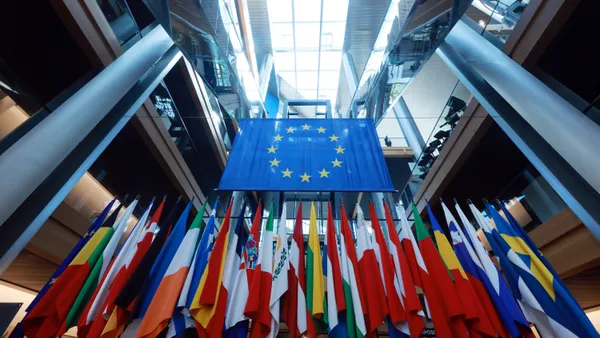Dive Brief:
- Dozens of Democratic lawmakers are pressing the Securities and Exchange Commission to remain dedicated to enforcing its climate risk disclosure rule and holding corporations accountable for their carbon footprint, according to a June 4 letter addressed to SEC Chair Gary Gensler.
- Though the letter — spearheaded by Sen. Elizabeth Warren (D-Mass.), Rep. Maxine Waters (D-Calif.) and signed by 36 other lawmakers — called the agency’s rule “an important step forward,” it criticized the agency’s decision to pare it down in reaction to “intense corporate lobbying over the past two years, in ways that offer too much discretion to corporate managers to decide what information must be disclosed.” The SEC pivoted from its 2022 proposal and scrapped scope 3 emissions disclosures entirely when it passed its final rule in March.
- The group of 38 Congress members asked the SEC to “vigorously defend” its now-stayed climate rule — which faces several challenges in the U.S. Eighth Circuit of Appeals — and to “spare no litigation resources to protect the rule.” The agency was also asked to enforce existing climate-related rules, such as its 2010 guidance on climate change, in the meantime.
Dive Insight:
The lawmakers asked the agency to remind issuers that some U.S. companies were still subject to other climate disclosure regulations, including those from California and the European Union — both of which include scope 3 emissions reporting — despite the pause in the SEC’s implementation of its rule.
California passed its own set of climate disclosure laws last year, including SB 253, which would require companies to report scope 3 emissions by 2027. While the SEC’s rule only applies to publicly traded companies by remit, California’s will apply to all businesses — public or private — that operate in the state and is expected to impact more than 5,300 companies. Similarly, the EU’s Corporate Sustainability Reporting Directive, which has more extensive scope 3 reporting requirements and a double materiality component, will impact large U.S. companies with EU subsidiaries starting 2026.
The SEC previously said scope 3 was removed from the final rule due to a large number of comments it received concerned about the cost of compliance, as well as the consistency and reliability of scope 3 data. Following the rule’s finalization on March 6, Gensler told reporters the agency had received over 24,000 comments since releasing the rule in March 2022, including around 8,100 in the 72 hours leading up to the vote.
“The omission of scope 3 requirements will allow some companies to report only a fraction of their emissions,” the lawmakers’ letter said. “Scope 3 emissions can account for as much as 90% of emissions for oil and gas companies — and potentially allow some companies to hide their emissions by shifting their scopes 1 and 2 emissions to entities in their supply chain.”
The group said these weaknesses limit the rule’s effectiveness and would require “costly efforts by the SEC and the investors” to address.
The letter also pointed to reporting guidelines put forward by the International Sustainability Standards Board, which released its inaugural frameworks last year. The lawmakers said ISSB’s standards were influenced in part by the SEC’s original climate disclosure proposal and were “quickly being adopted and aligned with reporting regimes in advanced economies.”











